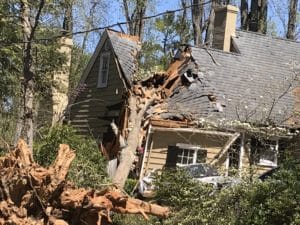
I had an opportunity recently to attend a seminar asking a specific question. What would you do in order to maintain the continuity of your business in the event of a major catastrophe? Suppose a major storm akin to Katrina was headed your way and you are in the business of adjusting claims. You have 100 employees with families and your area is under a mandatory evacuation order. Additionally, you have another 300 to 400 independent adjusters that you regularly count on during major catastrophes. You are heavily invested in this area in terms of customer business with several major homeowner carriers as well as MGAs that count on you for claims adjusting services. It is an opportunity for your business to create major revenue but without your employees it will not be possible. So, what do you do?
This is not a question of whether this will occur it is a matter of when it will occur. What is the first area that you must provide for if you plan to keep your business running? The answer to that is your staff and their families. That is your number one priority. If you can assure your staff members that their family is safe and fed, then it is much more likely that you can get them back to work. This may mean making advance plans through a hotel management service for 100 rooms as near as possible to the storm location but far enough away that the employee will feel confident that their family is comfortable with electricity and air-conditioning and food availability. Do not forget the family pets. Many people will not leave without their pets so whatever housing arrangements you make for your staff make certain they are pet friendly. Remind your employees to bring medications for themselves and family members.
The next critical area for storm evacuation is fuel. During Katrina there were many individuals who were willing to come back and work but fuel was a problem. For firms in the insurance/adjusting business, fuel is critical. Getting to and from the area that needs attention, cannot be accomplished without a vehicle and fuel. It is important that staff members keep their vehicles filled completely when advance warning is available as in the case of a hurricane. But, it is up to the company to see to it that their company personnel have access to fuel once they are back on the job. Remember, the likelihood of readily available supplies of fuel once insurance personnel can come back into the scene of the catastrophe is scant. Therefore alternative supplies must be arranged for ahead of time. Again there are services where this can be arranged.
Your company must have a re-entry plan for the employees or contractors that will be working for you. This again is something that needs to be prearranged. Going back to Katrina, the city was cordoned off to all but essential personnel. People were not allowed in unless they had been screened by law enforcement. Getting people insurance money can be considered essential services if you plan ahead. Go to your local law enforcement and state Homeland Security agencies and explain to them what your company does. Make them understand the necessity of having your people in the affected area as soon as possible in order to start getting financial relief to the population. They will more than likely help you set up your disaster plan and be grateful for the advance preparation that you are doing.
Communication is another essential item for business continuity. Cell phone use became next to impossible during Katrina for anyone whose home base was the greater New Orleans area. Towers were damaged, and signals were being re-routed but not all successfully. Also, where many people stated they communicated via text, what was not widely known was that many of those texts took hours to appear and by that time the subject you were being texted about was history. Business communications became less reliable then smoke signals. There is a radio system that uses satellites that is on the same system as first responder personnel. It is marketed to private industry. Since it uses the same system as the first responders, it is as reliable as their system. Should the system be down, it is going to get preferential treatment because it is necessary for law enforcement and first responders. This is worth looking into for your top management and operational staff who are coordinating the efforts of the individuals in the field. There can be a meeting point for adjusters to get assignments if cell phone use is not available and there is no internet service available. The radios can be used by personnel to communicate with staff in areas where internet service is established and obtain assignments from customers.
Your physical office may or may not be able to be occupied. If it can be occupied but there is no electricity and you have not made arrangements for generator power in advance, don�t waste your time after the catastrophe. There won’t be any available. Each business owners’ need for his physical location will dictate the need for generator power. Can you access your systems from a remote hosting facility or are all your computer systems located in your physical office? Have you made alternate arrangements for incoming phone calls to your physical office so that your clients can communicate with you? If you choose to have generator power at your physical office then you need to contract for fuel in advance. Arrangements for tankers can be made to be at your office as soon as practicable. You can also arrange for generators to be leased prior to catastrophes that will be delivered to your site on trucks.
There is one item that is most critical in your plan: CASH IS KING! Get your hands on as much cash as possible prior to a catastrophic event or have a place away from the event that you can procure cash. No electricity means no ATM machines and many ATM machines that have electricity will be out of cash.
Setting up a continuity business plan takes a great deal of effort and planning. We have just skimmed an outline of what you need to start a plan. The above is not by any means a complete list of all items necessary for your business. This article is meant to get you thinking as a leader in your company. What would I do if this occurred? If you are the owner, assign someone to setup a business continuity plan or a group of people to do it. One thing that is imperative is that the plan needs at least quarterly reviewing and depending on the size of your firm maybe more often. This is not a project you write and then place on a shelf. It is something that needs to be constantly updated when new personnel are brought on board, new clients are acquired, etc. After a catastrophe, you should always have a post-mortem to assess what worked really well and what needs improvement. There may have been things that occurred that were not in the plan. If so, these need to be incorporated in your update.
This is the start of the storm season and we have already seen multiple tornadoes and rain events that may have affected your area. Did you have a business continuity plan? If you remember one thought from this article it should be:
DISASTER BRINGS OPPORTUNITY!
Contact Information
Niki Wilson, Director of Sales & Marketing
ClickClaims/E-Claim.com, LLC
nikiwilson@e-claim.com
877.694.8375
www.clickclaims.com
LinkedIn: https://www.linkedin.com/company/e-claim.com-llc

